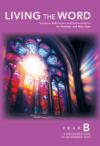Scripture Study for
The Most Holy Body and Blood of Christ
Genesis 14:18–20 / Psalm 110:4b / 1 Corinthians 11:23–26 / Luke 9:11b–17
<< Back to LECTIONARY RESOURCES
Understanding the Word
By Dianne Bergant, C.S.A.
Names play a very important role in the first story. The name Melchizedek comes from the Hebrew words for “my king” and “righteous.” Salem is probably a shortened form of the name Jerusalem, the Jebusite city that was ultimately captured by David and made the capital of his kingdom. The words pronounced by Melchizedek are both a blessing for Abram and an exclamation of praise of God Most High. Abram then offers a tenth of his goods to Melchizedek. Thus, the story introduces us to the importance of the city of Jerusalem with its king and its cultic life.
In describing his version of the Last Supper, Paul used technical and formulaic language: what he received, he now hands down. He did not receive the tradition in direct revelation from the Lord, but by word of mouth, the usual way a religious heritage is transmitted. Jesus’ sharing of the blessed bread and cup was a prophetic symbolic action that anticipated his death. In the memorial celebration, the past, the present, and the future are brought together: the past in the commemoration of his death; the present in the ritual of remembrance itself; the future in his parousía, his coming again.
The eucharistic overtones in the feeding of the multitude are obvious: he blessed . . . he broke . . . he gave to eat. It is difficult to know whether the historical Jesus actually spoke these words, and if so, whether it was done with an eye to his last supper, which was itself a foreshadowing of the final messianic banquet. However, we can be certain that the Gospel writer wanted these connections to be made. This feeding account might also allude to the final meal in the reign of God. The apostles are actually the ones through whom the crowds experience the munificence of Jesus. The author of the Gospel shows that Jesus provides for his people through the agency of the church. The many-leveled meaning of the story rests on the miraculous abundance that God provides through Jesus.
